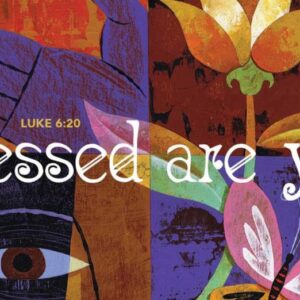Luke 6:20-31
20 Then Jesus looked up at his disciples and said:
“Blessed are you who are poor,
for yours is the kingdom of God.
21 “Blessed are you who are hungry now,
for you will be filled.
“Blessed are you who weep now,
for you will laugh.
22 “Blessed are you when people hate you, and when they exclude you, revile you, and defame you on account of the Son of humanity. 23 Rejoice in that day and leap for joy, for surely your reward is great in heaven; for that is what their ancestors did to the prophets.
24 “But woe to you who are rich,
for you have received your consolation.
25 “Woe to you who are full now,
for you will be hungry.
“Woe to you who are laughing now,
for you will mourn and weep.
26 “Woe to you when all speak well of you, for that is what their ancestors did to the false prophets.
27 “But I say to you that listen, Love your enemies, do good to those who hate you, 28 bless those who curse you, pray for those who abuse you. 29 If anyone strikes you on the cheek, offer the other also; and from anyone who takes away your coat do not withhold even your shirt. 30 Give to everyone who begs from you; and if anyone takes away your goods, do not ask for them again.
31 Do to others as you would have them do to you.”
————————
Please pray with me this morning, church:
Holy God,
We lovingly remember those who have died
Who have joined the great company of all the heavenly saints.
We recognize our calling through our baptism
To be holy and saints in our own time and our own place.
Renew and restore our hearts in your promises, God.
Sustain and nourish us in the calling and the hope
We have received from you.
Amen.
————————
By now, church, you know that my favorite sacrament is baptism, right? I mean, like, besides all the lovely important imagery and deep meaning of the act of baptism itself, I just have a lot of fun when I get to shower you with water and remind you of your baptism. It’s one of the more playful aspects of worship and I take a great amount of delight in it.
We should delight in worship, I think. We’ve got enough stodginess in our lives, amen?
But I think I’ve also told you before that baptism hasn’t always been my favorite sacrament. Growing up, communion was extremely important to me. I cherished the opportunities to have something placed in my hand and be told that this was a gift of God and it was for me. Powerful, powerful stuff. That, and it was kind of a snack break in the middle of the service, so that felt nice, too.
It was really during seminary that this shift in having a new favorite sacrament happened. As I dove more into baptism and all the things wrapped up in it and this idea of, not just of baptism as a singular event and a kind of one-and-done-type thing, but this idea of a baptismal way of living, I really started to feel like we don’t talk about baptism all that much or all that importantly in the Lutheran church.
And just as a side note, I know Reformation Sunday was last week and we kind of got all our Lutheranism out last week, but if you’re new to this whole Lutheran thing or you just are in need of a refresher, a little bit of Lutheran theology for you this morning…the Lutheran church confesses there are 2 Sacraments: Baptism and Communion. The Catholic Church confesses there are 7, but Luther was like, “Ehhhh…all that other stuff is kinda extraneous and it doesn’t quite fit with what a sacrament is, so really there are only 2.” Side note to the side note, Luther would have also lobbied pretty hard for Confession and Forgiveness to be considered a Sacrament, but he landed on 2. A Sacrament, by the way, Luther said, is an outward and tangible expression of an inward and divine reality. It’s a physical thing, something you can touch, connected with a word of promise from God, and instituted by Christ. Of all the lovely and meaningful aspects of our faith and worship, Luther said, Baptism and Communion fit those criteria.
So, of the two, I have a clear preference for baptism. And I’m not exactly apologetic about it, either.
All Saints Sunday is when we get to lean in hard to these foundational understandings of baptism.
That through our baptism, we are named “Beloved child of God” and our lives are claimed by God for God’s purposes. That through an act as small as a trickle of water running down our foreheads, God somehow reaches down into the world, the divine touches the temporal, heaven meets earth, and the lines between each get blurred, if just for a moment. We are joined to God’s family and we make promises as a family. As parents, as sponsors, and even you, church, even this family, we make promises to God, to the baptized, and to one another. Baptism is this kind of public demonstration of a reality that we believe is already present—that, in fact, we are God’s, we are beloved, we are part of and joined to the body of Christ, and that we are given to and for one another and called to live for the sake of others.
These realities are already true; baptism is a tangible expression of that.
And as members of God’s family, as God’s people given and living to and for one another, you are declared holy. You are made saints. You are declared and made that which you already are, a reality that is already present…you are holy and you are saints. You are enlightened with the Holy Spirit moving and active in your life and in the world, propelling you to be the disciples of Christ that you have been called by God in your baptism to be.
When we talk about All Saints Day, we remember, yes, all those who have gone before us, all the faithful departed, all those giants and titans whose shoulders upon which we stand…but we are are also talking about you, dear child…you, dear people…you, dear church…you are saints and you are holy. And you are called, just like all those who came before you, to do your best to live a life worthy of the calling you have received from God.
I mentioned in our announcements that we had a baptism last Sunday, in the afternoon. We have some folks who are part of our community, who are part of the life of this community—we have a number of folks who are part of our community who are being cautious about the pandemic, and they worship with us and participate as much as they can virtually, and they’re part of this community. And so we had some folks who wanted to have their newest baby girl baptized.
And so we did. And you know what, church? You were there. You were present. This community of faith, this family of saints, was present. Just like I can’t really explain how the divine and the earthly meet and intermingle in the sacraments, in a way I can’t really explain, you were present at Alexis’ baptism.
Thank you for showing up. Thank you for promising to support Shannon and John and big sister, Brooklyn. Thank you for letting them know that you take very seriously the responsibility to be a loving, affirming, nurturing place for them. Thank you.
And just as somehow you were present at Alexis’ baptism last week, just as somehow God reaches through time in baptism, God and Christ are somehow present in the meal we share together. The sacraments have a weird way of blurring these lines between the heavenly and the earthly. There’s some sort of intermixing of the two when we participate in the Sacraments. And although I give the slight edge to baptism, I still do love communion.
I heard a sermon a number of years ago talking about Communion and All Saints and have always wanted to mention it, but hadn’t really found the opportunity until now. It broke open this whole idea of communion and saints for me. If we say and confess that somehow Christ is present in the meal we share together, if it’s true that the sacraments have a way of facilitating the meeting of the divine and the earthly, then what or who else might be present at this table? We talk about the Communion of Saints and we generally mean the great multitude of all those who have gone before, but what about Communion with the saints? If Christ is somehow present in this meal, if God shows up in this sacrament week after week, isn’t it possible that there is room around this table for your loved one, too?
It’s an understanding that kind of borrows from Mexican culture and a Mexican Feast Day we know as Día de los Muertos, the Day of the Dead. That there’s a connection with our loved ones who have died that isn’t so easily broken. That’s a very comforting thought for me…that this meal, shared among friends, shared among family, shared in communion with God and Christ…is also a meal shared with loved ones who have died.
And if I somehow get to be included in such a meal with such a remarkable guest list, then maybe there’s hope for me yet to squeak out just a little bit of saintliness in this life, too.
What a hope to which to be called. What a glorious inheritance with which to be so richly blessed.
What a treasure.
As we begin our season of Stewardship this month, we’re going to be talking about hope, and treasures…and we’re calling this season A Treasured Hope. We’re asking you to think about what it is you treasure, church. What do you hope for? What are your dreams?
What are the treasures of New Hope? And how can you support the treasure that is New Hope?
You’ll be getting letters in your mailboxes in the coming days and we’ll have some Stewardship Moments in worship over the coming weeks, but those are the questions. What is your treasure? What are the treasures of New Hope? And what’s your part, what’s your role, in this treasured hope?
God bless you, saints.
You have been called according to God’s purposes.
Be refreshed for this work at this font.
Be nourished for this calling at this table.
Commune with Christ and all the saints.
Receive what you are.
Become what you are called to be.
Blessed saints.

